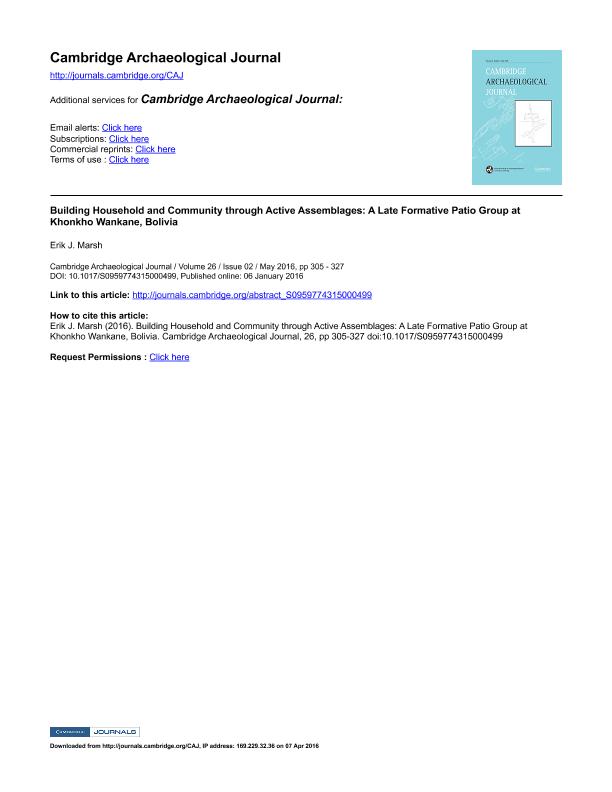Mostrar el registro sencillo del ítem
dc.contributor.author
Marsh, Erik Johnson

dc.date.available
2022-11-24T17:55:55Z
dc.date.issued
2016-05
dc.identifier.citation
Marsh, Erik Johnson; Building household and community through active assemblages: A late formative patio group at Khonkho Wankane, Bolivia; Cambridge University Press; Cambridge Archaeological Journal; 26; 2; 5-2016; 305-327
dc.identifier.issn
0959-7743
dc.identifier.uri
http://hdl.handle.net/11336/178870
dc.description.abstract
A community is an active assemblage of human and non-human elements bound together by interactions. Archaeologies of communities shed light on sets of overlapping and geographically emplaced assemblages of individuals, practices, spaces, buildings, objects, animals and landscapes. This article presents an archaeology of communities based on a remarkably well preserved Late Formative (ad 1–500) patio group at Khonkho Wankane, Bolivia. Excavation data provide a high-resolution chronology and document two varieties of assemblages: (1) those that played a greater role in biologically and socially reproducing the community, such as daily food and tool production; and (2) those that played a greater role in its transformation, such as gatherings, work parties and construction projects. In the patio group, intimate meetings took place in small, private spaces where incense was burned. Larger gatherings took place in an outdoor space where painted Kalasasaya small jars and bowls were active elements in interactions between residents and visitors. These events most likely involved work parties that contributed to the physical and social construction of the community. Assemblages at multiple scales built a diverse Late Formative community, which played a principal role in regional interaction networks. Within a few generations of residents leaving their homes in Khonkho, local and regional interactions generated the emergence of a state at Tiwanaku.
dc.format
application/pdf
dc.language.iso
eng
dc.publisher
Cambridge University Press

dc.rights
info:eu-repo/semantics/openAccess
dc.rights.uri
https://creativecommons.org/licenses/by-nc-sa/2.5/ar/
dc.subject
Archaeology of communities
dc.subject
Active assemblages
dc.subject
Household Archaeology
dc.subject
Khonkho Wankane, Bolivia
dc.subject.classification
Arqueología

dc.subject.classification
Historia y Arqueología

dc.subject.classification
HUMANIDADES

dc.title
Building household and community through active assemblages: A late formative patio group at Khonkho Wankane, Bolivia
dc.type
info:eu-repo/semantics/article
dc.type
info:ar-repo/semantics/artículo
dc.type
info:eu-repo/semantics/publishedVersion
dc.date.updated
2022-11-04T14:08:57Z
dc.identifier.eissn
1474-0540
dc.journal.volume
26
dc.journal.number
2
dc.journal.pagination
305-327
dc.journal.pais
Reino Unido

dc.journal.ciudad
Cambridge
dc.description.fil
Fil: Marsh, Erik Johnson. Consejo Nacional de Investigaciones Científicas y Técnicas. Centro Científico Tecnológico Conicet - Mendoza; Argentina. Universidad Nacional de Cuyo. Facultad de Ciencias Exactas y Naturales. Laboratorio de Paleoecología Humana; Argentina
dc.journal.title
Cambridge Archaeological Journal
dc.relation.alternativeid
info:eu-repo/semantics/altIdentifier/url/https://www.cambridge.org/core/journals/cambridge-archaeological-journal/article/building-household-and-community-through-active-assemblages-a-late-formative-patio-group-at-khonkho-wankane-bolivia/F378E6E74B1730A0DFE2E32AA293DAB5
dc.relation.alternativeid
info:eu-repo/semantics/altIdentifier/doi/http://dx.doi.org/10.1017/s0959774315000499
Archivos asociados
